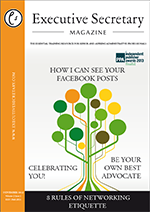All Things Admin Joins ASAP. Learn More ›
Interview with Lucy Brazier, CEO & Founder of Executive Secretary Magazine
February 14, 2014
Lucy Brazier is the founder and CEO of Executive Secretary Magazine.
How did you become a publisher?
Lucy Brazier: I can’t quite believe that this year will be my 26th year in publishing. All the way through school I was very involved with the school newspaper and annual magazine but bizarrely, didn’t consider a career in the press.
Halfway through my gap year, I got a three day temp job at a local newspaper and the rest is history. I have worked for The Times, The Independent, and numerous consumer and trade titles during my career, latterly as Publishing Director for a £90m PLC in charge of 13 titles for the legal sector. In 2011, I left to start my own publication.
How did you come up with the idea to publish a magazine for assistants?
Prior to employing Matthew, my current Assistant, my Assistant of almost 10 years, Elizabeth (or Bob as she preferred to be called) had always said that it was a shame there wasn’t a magazine that took the career of an Assistant seriously and addressed them in business terms.
In 2003, I was doing PR for about 6 months on a freelance basis. To cut a long story short, this led to a lunch meeting with the then owner of a subscription newsletter that circulated widely in the UK to senior Assistants.
She had been running it since 1993 and was ready to retire. After several conversations, she asked me if I would like to take it over. I agreed and ran it for several years as just a newsletter, but always in the back of my head, had the idea that I would like to re-launch it as a global training publication, complete with a website & events.
Over the next seven years, I got to know the market properly. The more I researched it, the more it became obvious that there was a real gap in the market. Assistants all over the world were crying out for solid, inspirational training. The opportunity came in 2011, when I was made redundant and was finally able to afford to launch Executive Secretary properly.
It is widely documented that you launched Executive Secretary with no marketing budget, using just social media. How did that work?
When I was setting the launch plans, it became very obvious, very quickly that what we needed to build was not a subscriber list, but a community. And that meant that it had to be an ongoing conversation.
I began by joining every group for Assistants on LinkedIn that I could find and asking the members of those groups who they had seen speaking at conferences and events whom they thought were exceptional and/or inspiring.
I then contacted those speakers via LinkedIn and asked them to consider writing for me. I also followed them on Twitter so I could see what they were putting out to the community.
I then asked the community which subjects they felt they really needed training in. Where we didn’t have a writer already that could cover these topics, I went to Amazon and found the bestselling authors in the world on these subjects and approached them via LinkedIn.
In the meantime, we also connected both on LinkedIn and on Twitter with over 80 associations for Assistants all over the world and asked for their opinions and feedback. We also set up our own LinkedIn group and Twitter account.
What began as a trickle, a couple of people joining a day, is now up to over 40 a day signing up to the LinkedIn group. We have over 18,000 members and a conversation between Assistants all over the world that keeps my finger on the pulse of what content we need to put out to our community on an ongoing basis.
Why the title Executive Secretary? 
When we re-launched, we brainstormed this issue extensively, We were aware that especially in the States, the more common name for the role was ‘Assistant’ and this was a huge market for us. However, in much of the rest of the world, the title was still Secretary (which by the way means ‘Keeper of Secrets’). Some of the most powerful people in the world are Secretaries – think Secretary of State or Secretary General.
In the end, we decided, as a 21 year-old brand that was well recognised in the UK, our brand values and what Executive Secretary stands for i.e. top quality training, no advertising, and a commitment to the market etc. would be at risk if we had to start building a brand from scratch. It would be the equivalent of changing the name of "The Times" or "The Lady" to bring it up to date,
It is also worth noting that OfficeTeam has recently pointed to results of research in the US which say that the job title of ‘Assistant’ is becoming less popular as the role develops due to the fact that the term ‘assist’ insinuates assisting and not doing. It seems that the name of "Secretary" is gaining popularity again and may come back into fashion.
We totally understand why some Assistants periodically query our reasoning behind the name of our brand, but hope you understand our choice to keep the title as it is.
You are also the Global Brand Ambassador for IYOTSA (the International Year of the Secretary & Administrative Assistant). Can you tell us a bit about this?
IYOTSA takes place in 2014. In 1984, a similar international celebration was organised by the PSI and 2014 marks its 30th anniversary. The 2014 celebrations are coming out of South Africa and aim to raise the profile of the role as a profession, rather than just a job, changing the perception of the secretarial role as purely a support role and explaining how businesses can best use those who are in this role.
The vision is that we change the world for Assistants worldwide next year so that they are recognised for the work that they do. Not just an inward exercise in self-congratulation, we want Assistants, their businesses, Associations, trainers and companies that support this sector to campaign for the recognition of this role as a profession.
Since 2008 and the collapse of Lehman’s, Assistants have been doing the roles of the middle management in addition to their own roles, because that layer of management was made redundant. Initially, Assistants were told that that they would be taking on these tasks 'in the interim', and most Assistants didn't get any training for these additional tasks or any extra money but did get an increase in workload of usually about 50% on top of what they were doing already. This makes it the perfect time to launch this campaign so businesses understand what the role is now. This year should be a celebration of the backbone of commerce.
We want to make businesses understand that companies that use the role properly see their Assistants as far more of a strategic business partner these days, rather than as a pure support mechanism. In many cases we are seeing Heads of Administration on Boards of companies – rather than the common perception of the Assistant as a Dolly Parton or Mad Men stereotype. Please see Melba Duncan's excellent article on this subject. If you would like more information, please shout loudly.
Describe yourself in one sentence.
Fiercely loyal and committed to the people who are committed to me and what we are trying to do.
To end, what’s your credo in life?
To leave the world a better place than when I came into it.
This article first appeared in Executive Secretary Magazine.
Join the Conversation
Welcome to the ASAP Circle, a community platform for peer-to-peer conversation on trending topics, professional challenges, and shared experiences. We even have designated spaces for weekly Tuesday Coffee Breaks.










